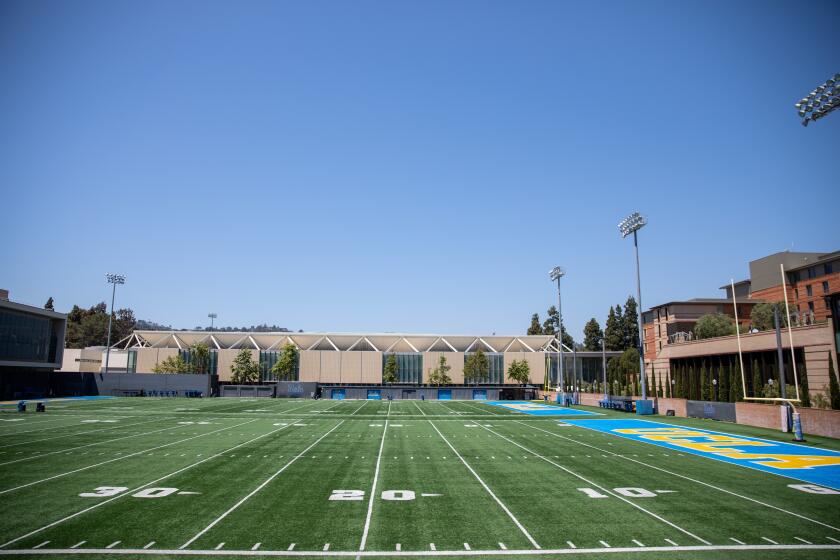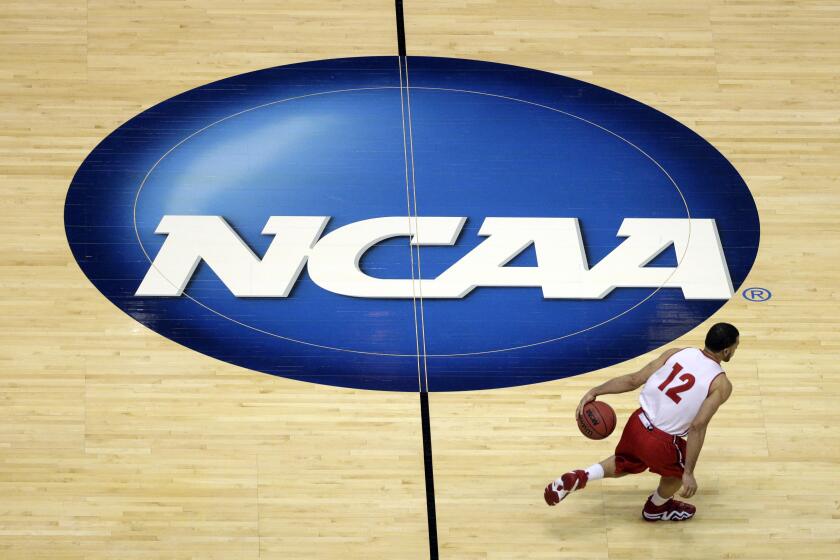How UCLA’s Chase Griffin became ‘the face of the athlete voice of NIL’
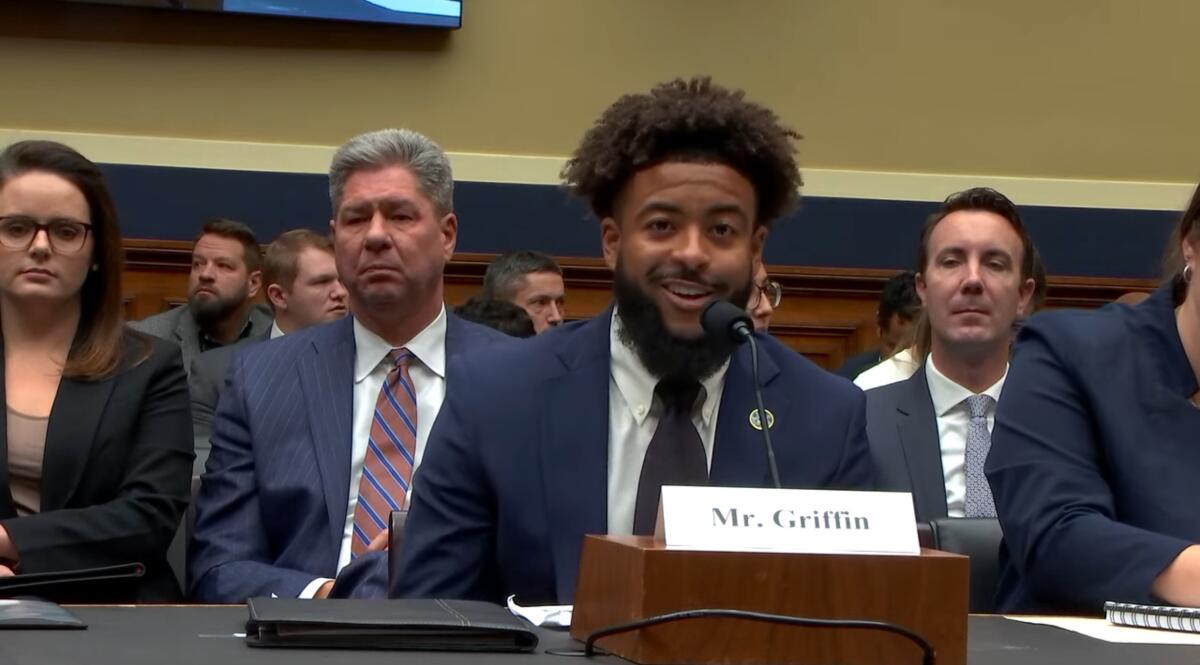
- Share via
Faced with an unfamiliar situation, Chase Griffin relied on natural instincts. He surveyed the scene, felt the pressure and stepped up to face it.
Qualities that served him as UCLA’s quarterback came in handy testifying before Congress earlier this year. Only no audible was needed given all the time he had put into preparing his remarks about how these politicians were wrong in their misguided attempt to protect college athletes.
“It is disheartening,” Griffin told a U.S. House of Representatives subcommittee on innovation, data and commerce, “to see a federal bill that ignores our hard work and the value we create by putting obstacles in our pathway to the American dream.”
Griffin was speaking out against the FAIR College Sports Act, a proposed bill that would increase regulation of name, image and likeness deals in the name of fairness and transparency. In reality, Griffin felt the bill did nothing more than provide another roadblock to athletes receiving the compensation to which they are entitled.
The UC Regents ordered UCLA to pay rival California the max tax for leaving the Pac-12 for the Big Ten, but in a temporary triumph for the Bruins, they are on the hook for only half the previously allotted period.
He felt so strongly about the issue that he paid his own way to take a red-eye flight to Washington, powering his way through just a few hours of sleep to defend athletes’ rights to maximize their NIL dollars.
“Frankly,” Griffin recently told The Times, “the bill that we were discussing there, the FAIR Act, wasn’t a good bill and I thought that I had to offer truthfully and experientially my knowledge on what has been and what it can continue to be with unfettered access for college athletes to exercise their NIL rights.”
Perhaps it’s no coincidence that four months later, the bill is getting no traction thanks in part to the influence of the third-string quarterback who has become a go-to guy for NIL expertise.
“I can’t overstate the importance of Chase’s testimony,” Rep. Lori Trahan (D-Mass.) said of the first active college football player to testify before Congress regarding the prospects of federal legislation to regulate NIL. “I don’t know many 23-year-olds who would feel comfortable doing what he did. He’s sitting at the witness table just a couple of seats down from the president of the NCAA and looking up at the chairman of the committee and telling them that he vehemently disagrees with many of the proposals that they put forward.”
It may not be the last time that Mr. Griffin goes to Washington. While he’ll have plenty of options after completing his final football season in the fall, he’s on a trajectory that could make him the next Jack Kemp, J.C. Watts or Gerald Ford — football players who went on to successful careers as politicians.
1
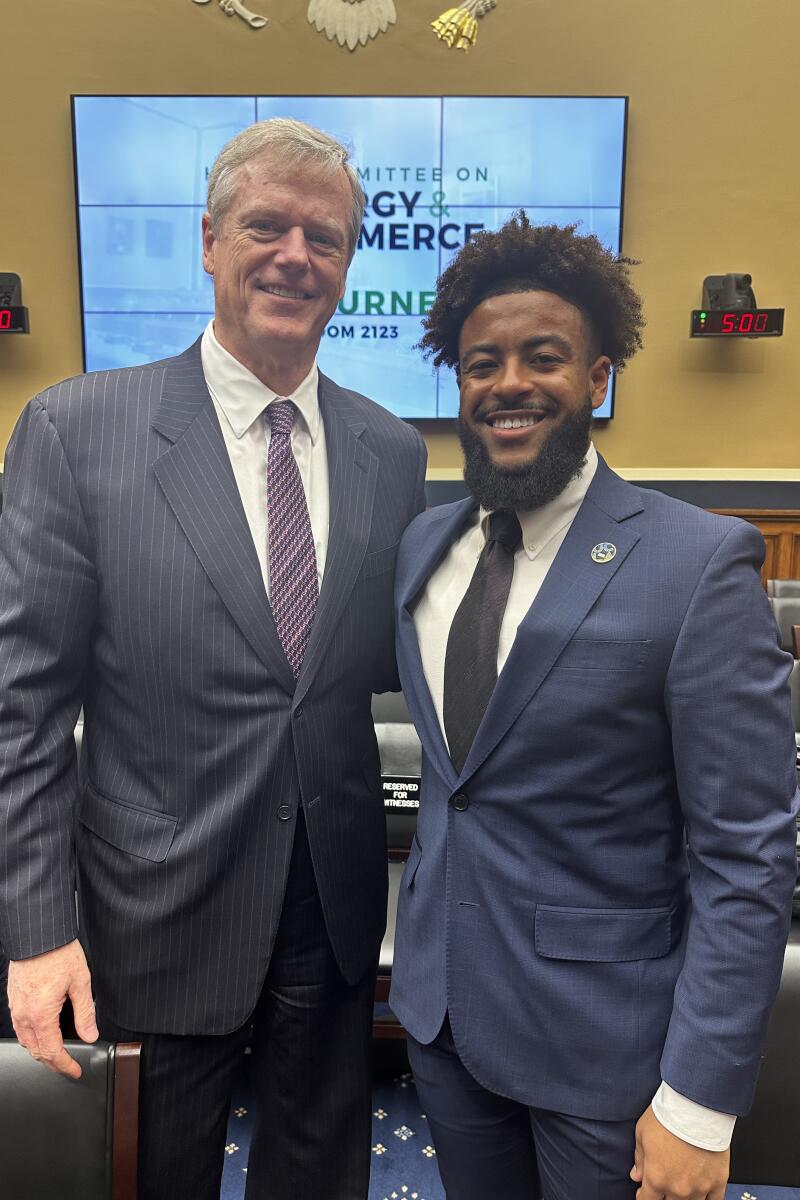
2
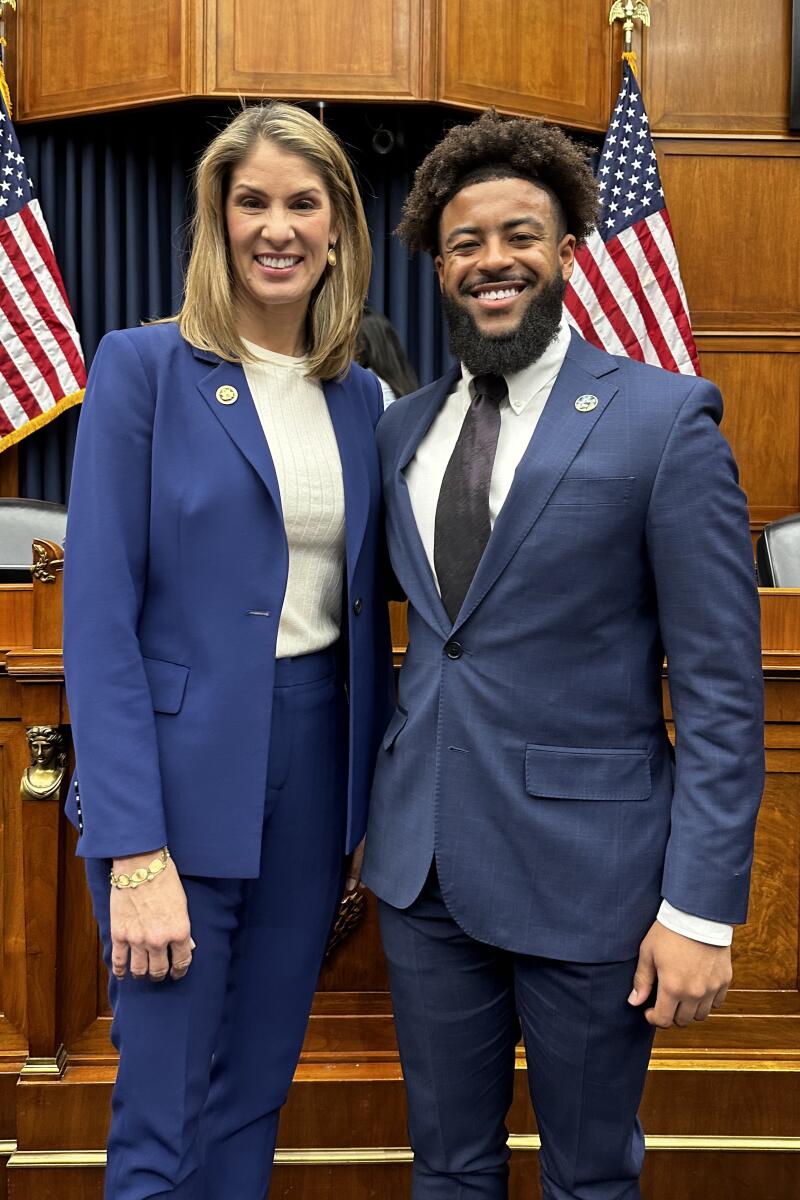
1. UCLA quarterback Chase Griffin, right, stands with NCAA president Charlie Baker after testifying before a congressional subcommittee on Capitol Hill in January. 2. Griffin stands next to U.S. Rep. Lori Trahan (D-Mass.) after testifying in January. (Will Griffin)
“Chase is going to be one of the next presidents of the United States, all right, and I really mean that,” UCLA quarterbacks coach Ted White said of the player recently selected the school’s young alumnus of the year. “My first conversation with him, I saw his vision, I saw his work ethic, I saw not only how he cares about the game of football but how he cares about people and that’s Chase Griffin in a nutshell.”
His resume is the stuff of football and academic dreams. In addition to winning his only start at the Rose Bowl — a 27-10 victory over Arizona in 2020 — Griffin earned an undergraduate degree from the Luskin School of Public Affairs in two years, a master’s degree in transformative coaching and leadership from the School of Education and Information Sciences and a master’s in legal studies from the School of Law.
Equally impressive is Griffin’s haul of more than 40 NIL deals with companies in a dozen states, leading to his selection as national NIL athlete of the year from the NIL Summit and Opendorse. He’s a one-man operation — Chase Griffin Inc., if you will — serving as his own representative in deal negotiations and creating his own content.
“Chase is certainly one of the faces of NIL,” said Blake Lawrence, co-founder and chief executive officer of Opendorse, the marketing platform that helps connect athletes with NIL deals. “He’s the face of the athlete voice of NIL because he’s been a strong advocate for student-athletes and his testimony in Congress is proof of that.”
Trahan invited Griffin to testify after following his success in NIL endeavors and believing he would be the perfect spokesman for college athletes.
“The thing is, that perspective — probably intentionally, in some cases — has been left out of the conversation in Washington over the future of college athletics,” Trahan said, “so we have a parade of industry leaders and college presidents and conference commissioners who come in and meet with us and testify before committees and who advocate for legislation and they’re able to do that because they have the infrastructure and the resources to do it.
“Meanwhile, athletes — particularly athletes who share Chase’s perspective — tend to be left behind when their school president goes to Washington and that’s what we wanted to change.”
Among other things, Griffin told Congress that it should study the impact of major brands and small businesses partnering with college athletes and give the NIL market time to grow and innovate before considering any legislation. Should Congress later feel the need to pass NIL legislation, Griffin said he supported the College Athlete Economic Freedom Act sponsored by Trahan and Sen. Chris Murphy (D-Conn.).
“The College Athlete Economic Freedom Act preserves a lot of the freedoms that we have now as well as giving international college athletes the ability to monetize their NIL and also provides more protections for Title IX going forward,” Griffin told The Times. “And I think it’s a relatively simple and straightforward act, it just protects college athletes’ ability to continue monetizing their NIL.”
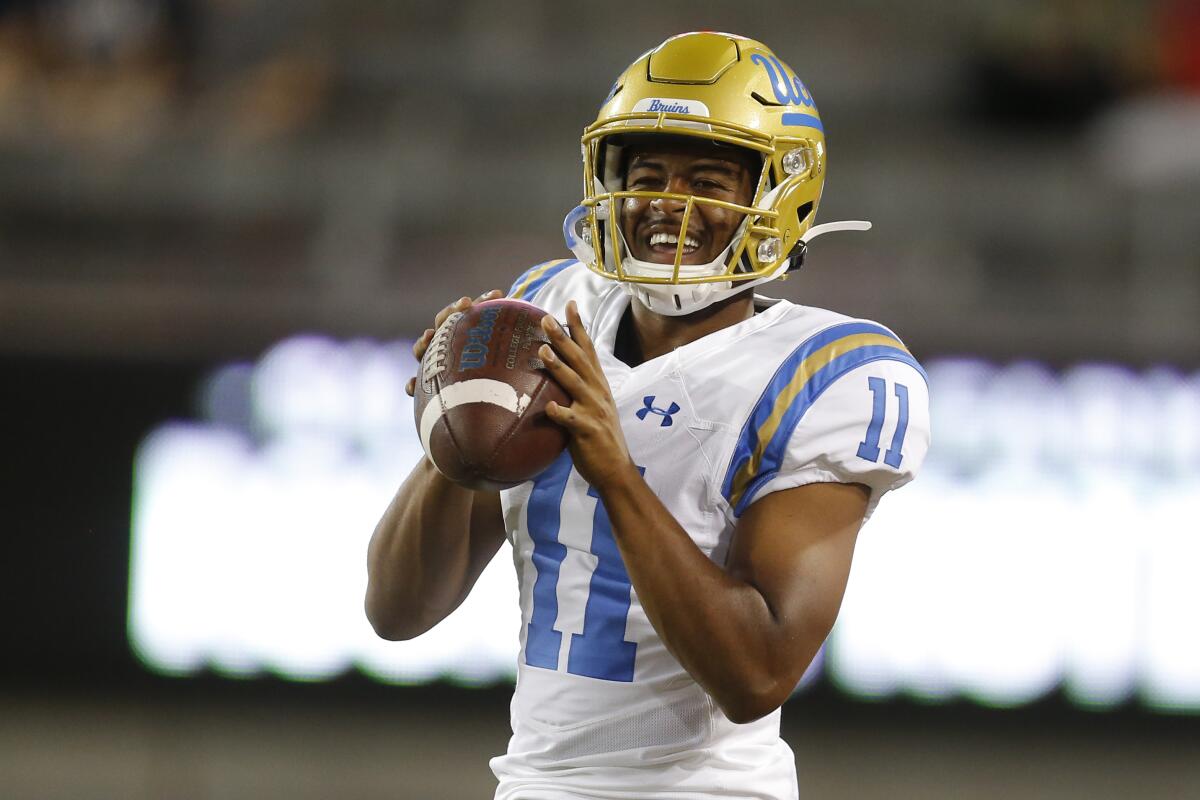
Griffin said NIL is flourishing in part because the NCAA has relinquished a lot of its controls, allowing the proliferation of deals between brands and athletes that have attracted new viewers to sports that historically haven’t been widely supported. This spring, the women’s Division I basketball national championship game posted higher television ratings than its men’s counterpart.
“NIL as a whole, a lot of the detractors before it went into action said that it was going to be the death of college sports; I think because of NIL, more people are watching college sports than ever,” Griffin said. “The more empowered the college athletes are to take control over their own persona — how they’re publicized, the brands that they work with, who they’re associated with — fans start to see these college athletes as people and they show up to the games because they want to root for a person, they feel inspired by them.”
As far as Griffin is concerned, the fewer NIL restrictions, the better — even when it comes to pay-for-play. In what is believed to be the most lucrative arrangement involving a college athlete, forward Great Osobor reportedly secured $2 million in NIL deals as part of his transfer from Utah State to Washington, even though the Mountain West Conference player of the year hasn’t made a basket for the Huskies.
Griffin compared athletes changing schools in search of a bigger payday to coaches seeking the highest bidder for their services.
The NCAA and five major college sports conferences agree to settle antitrust allegations for nearly $2.8 billion over the next 10 years.
“If coaches can do that, why are we placing some sort of insane moral standard for college athletes?” Griffin said. “And I think at the same time, competition is part of the game and college athletes throughout the time of the market are only going to be compensated if they’re performing as far as that goes. Now, there should be a baseline compensation for performing on the team because if coaches have a salary, then the college athletes should have a salary.”
More money could be on the way. Griffin said revenue sharing for college athletes should arrive in a matter of months based on widespread support from athletic directors and NCAA administrators. The apparent settlement of the House vs. NCAA class-action lawsuit would provide billions of dollars in retroactive payments to college athletes for lost NIL opportunities dating back to 2016 as well as a model for future revenue sharing agreements.
The lawsuit and its potential implications are among the topics Griffin has covered in The Athletes Bureau, a Substack platform he created to amplify the voice of college athletes. In a recent podcast, Griffin solicited NIL tips from Claremont McKenna basketball player Connor Printz, who has more than a million followers on social media and has secured more than 100 NIL deals despite playing at the NCAA Division III level.
Printz’s biggest advice? Be proactive in reaching out to brands, post daily videos on TikTok, Instagram and Snapchat and respond to messages and comments on each platform.
Continually expanding his NIL knowledge has allowed Griffin to become UCLA’s resident expert on the topic, advising coaches and teammates about opportunities to increase their engagement in the space.
“I talk to him a lot about NIL, what direction it’s going in, what we should do just here as a school, how to just kick-start more things,” new Bruins football coach DeShaun Foster said. “So I’m just glad that we have Chase Griffin on our team and on our side.”
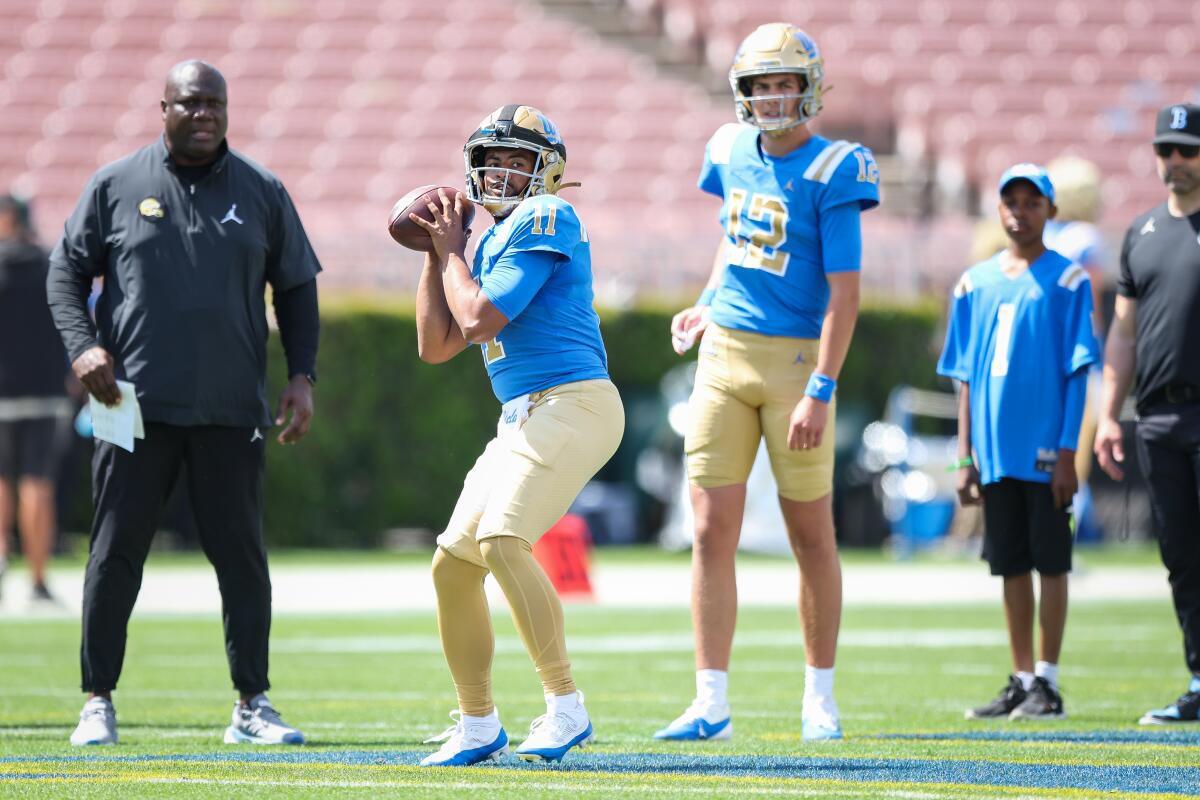
While he’s thrown only five passes combined over the last three seasons, Griffin’s sixth and final season as a Bruin might not be confined to the sideline. There could be situations calling for his veteran poise in which he would get the nod over top backup Justyn Martin — who will be a redshirt sophomore — if the Bruins needed a replacement for starter Ethan Garbers late in a tight game.
Griffin is the team’s only backup quarterback with experience as a starter, having replaced Dorian Thompson-Robinson for two games in 2020 when Thompson-Robinson was sidelined by contact tracing related to COVID-19.
“If my number’s ever called, I take pride in being ready,” Griffin said. “I prepare every single week like I’m starting.”
Given the time he and his teammates dedicate to the team, Griffin said players operate as employees but should be free to decide if they want to be designated as such by taking their case to the National Labor Relations Board, which has filed a complaint against USC to classify its athletes as employees. Even without employment status, Griffin said, compensation from NIL and revenue sharing should suffice.
Griffin told Congress that most college athletes don’t make “Lamborghini money” from NIL, though he may be an exception. He wouldn’t divulge his NIL income but said his deals each typically range from four figures to around six figures, meaning that he has accumulated the sort of wealth that would be the envy of some CEOs.
How did the Pac-12 die? These surprising decisions by USC, Oregon, Washington and others thwarted efforts to save the conference.
“My overall life goal is to create generational wealth early, which thankfully I’m in the process of doing now and then going into public service and philanthropy,” Griffin said. “Now, whether it’s more on the privatized, philanthropy side or on the public service side, it’s really just about helping others for me and I’ve been blessed through NIL to be able to practice some of those good habits while I’m still in college.”
Generously sharing his wealth, Griffin has donated more than $25,000 to the Los Angeles Regional Food Bank, providing 100,000 meals for the needy. Three years into the NIL era, he’s provided more than $50,000 in charitable donations, including $11 for each of the 344 points UCLA scored last season, the amount per point representing his jersey number adding up to $3,784.
Money management is something that Griffin is learning through part-time work in the University of California investment office, which controls the UC system’s roughly $170-billion portfolio of investments in retirement, endowment, working capital and cash. A larger role could be in the works as Griffin takes accounting and finance courses this fall through a UCLA Extension pre-MBA studies program.
And about that possible future in politics? Stay tuned. Trahan was so impressed with Griffin’s testimony that she joked about him taking her place on the Energy and Commerce Committee in a few years.
“Look, athletes do well here in Congress, right?” said Trahan, herself a former Georgetown volleyball player. “They’re disciplined, they understand what it takes to do the work and they’re collaborative, they’re good team players, so there’s a lot of great qualities that he could transfer and I hope he does because we need more articulate voices and talents like Chase Griffin.”
More to Read
Go beyond the scoreboard
Get the latest on L.A.'s teams in the daily Sports Report newsletter.
You may occasionally receive promotional content from the Los Angeles Times.

